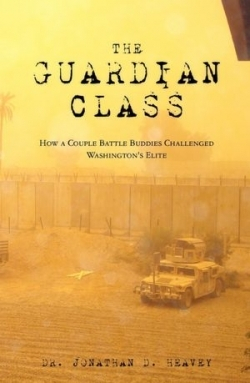The Guardian Class
How a Couple Battle Buddies Challenged Washington's Elite
Written in an authentic, angry voice, Dr. Jonathan D. Heavey’s memoir of the time he served in Iraq begins with his altruistic decision to join the military. The story follows the author’s confusion and exhaustion during basic training, his experiences with the rigors and idiocies of military red tape, and his outrage over the senseless deaths of soldiers and collateral civilians. Ultimately, it focuses on the author’s inability to help the civilians, and more specifically, the children of Iraq.
Not long after leaving Walter Reed Hospital and joining the 101st Airborne Division in Iraq, the author and his physician assistant, John Knight, tend the wounded, adjust to life in a war zone, and seek ways to unite children with surgeons who can perform much needed trauma and burn surgeries. The men establish a nonprofit organization called the Hope.MD foundation. Much of the book is devoted to examples of the red tape, redundancies, and illogical rules and regulations that stand between the wounded children and the medical help they need. At times, the reader may skim through reproductions of mind-numbing forms and reports that the author wrote, rewrote, and faxed again and again. His follow up on these reports only leads to the discovery that they are “lost in the inner circle of Hades,” as Heavey describes it.
The frustration and utter idiocy of war is a theme that rings from each page. Take, for example, this passage: “They [lawyers, generals, admirals, etc.] are the ones who have never had the blood of their brothers on their hands, or a neglected child in their arms. I have. My brothers have …We are the members of the guardian class who have actually upheld our convictions.”
Sadly, the book is not well organized or crafted. Often the text reads as an angry rant, when it could have been distilled into scenes that play out the author’s underlying message of the work done by the guardian class. Dr. Heavey gives two stories equal weight: The story of life as an army surgeon in a war zone and the story of fighting red tape to create the Hope.MD foundation. Prioritizing one story or the other would have been better. The information he gives about life at war is much more interesting than the story of military bureaucracy. In addition, Heavey tends to truncate scenes and fails to transition from one subject to another. While the fuzzy black-and-white photographs and lack of captions will frustrate readers, the appendix of military acronyms will greatly aid their understanding of military speak.
Anyone intrigued by an insider’s raw, uncensored tales of war who is willing to exercise patience may find this book enthralling.
Reviewed by
Dawn Goldsmith
Disclosure: This article is not an endorsement, but a review. The publisher of this book provided free copies of the book and paid a small fee to have their book reviewed by a professional reviewer. Foreword Reviews and Clarion Reviews make no guarantee that the publisher will receive a positive review. Foreword Magazine, Inc. is disclosing this in accordance with the Federal Trade Commission’s 16 CFR, Part 255.

